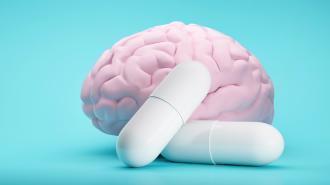A new type of schizophrenia treatment successfully treats a wider range of symptoms, with fewer major side effects, than existing antipsychotics, according to results in a new phase 3 trial, which should bolster the case for approving the drug.
“We are another step closer to potentially providing the first new class of medicine in more than 50 years to the millions of people worldwide living with schizophrenia,” said Steve Paul, CEO of Karuna Therapeutics, the drug’s maker.
The challenge: Schizophrenia is a serious mental illness affecting more than 20 million people worldwide. It interferes with a person’s perception of reality, which can be incredibly distressing and impair their ability to work or live independently.
Every schizophrenia treatment approved in the past 50 years has been an antipsychotic.
Schizophrenia symptoms are broadly categorized as positive (e.g., hallucinations and delusions), negative (e.g., social withdrawal and trouble enjoying life), and cognitive (e.g., trouble focusing and impaired memory).
Every schizophrenia treatment approved in the past 50 years has been an antipsychotic, though, which only addresses the illness’ positive symptoms. Antipsychotics also cause side effects, such as sedation, weight gain, and involuntary movements, that contribute to patients stopping treatment at high rates.
What’s new? While existing antipsychotics target the brain’s dopamine receptors, Boston biopharma company Karuna Therapeutics’ new schizophrenia treatment, KarXT (xanomeline-trospium), targets a completely different part of the brain: muscarinic receptors.
In a phase 3 trial, involving more than 250 adults diagnosed with schizophrenia and experiencing symptoms of psychosis, the medication significantly reduced the severity of both positive and negative schizophrenia symptoms.
KarXT wasn’t associated with the side effects common to antipsychotics, but 75% of participants in the treatment group did experience some adverse effects, compared to 58% in the placebo group.
KarXT significantly reduced the severity of both positive and negative schizophrenia symptoms.
Still, there was only a slight difference in discontinuation rates between the treatment and placebo groups (25% and 21%, respectively).
Karuna hopes to submit a New Drug Application for KarXT to the FDA in mid-2023, but first it needs more data about the drug’s acute efficacy and long-term safety, which it’s collecting in three ongoing trials.
The big picture: Karuna isn’t the only group exploring ways to treat schizophrenia that don’t involve the traditional dopamine targets.
Some researchers are seeing promising results from meds that target trace amine-associated receptors (TAARs), while others have identified specific proteins, genes, “dark genes,” and immune cells that could be effective treatment targets.
If any of these approaches can make their way from the lab to the clinic, they have the potential to help the millions of people living with untreated schizophrenia — or suffering the side effects of their only treatment options.
We’d love to hear from you! If you have a comment about this article or if you have a tip for a future Freethink story, please email us at [email protected].






